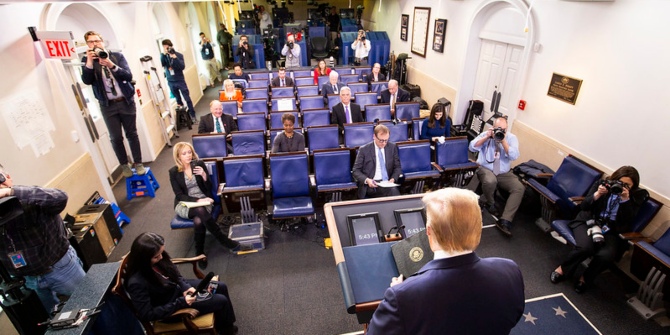 On Monday, the United States Supreme Court denied a request to stay the ruling of a federal district judge which had invalidated Alabama’s constitutional amendment banning gay marriage. Despite the ruling, many of the state’s probate judges have refused to provide marriage licenses, and were also instructed not to do so by the state Supreme Court’s Chief Justice. Heather Elliott writes that the judges’ resistance is in part due to the fact that they face elections in a state where only 32 percent of the population favor same-sex marriage. She argues that Alabama is on the wrong side of states’ rights and marriage equality, and that the Supreme Court’s coming ruling on same-sex marriage will remove all doubt in Alabama, and across the country.
On Monday, the United States Supreme Court denied a request to stay the ruling of a federal district judge which had invalidated Alabama’s constitutional amendment banning gay marriage. Despite the ruling, many of the state’s probate judges have refused to provide marriage licenses, and were also instructed not to do so by the state Supreme Court’s Chief Justice. Heather Elliott writes that the judges’ resistance is in part due to the fact that they face elections in a state where only 32 percent of the population favor same-sex marriage. She argues that Alabama is on the wrong side of states’ rights and marriage equality, and that the Supreme Court’s coming ruling on same-sex marriage will remove all doubt in Alabama, and across the country.
The United States Supreme Court will decide before Independence Day – July 4th, 2015 – whether same-sex couples have the right to marry throughout America. The Court’s recent actions suggest that it will rule in favor of marriage equality: the Justices have permitted marriages between same-sex couples to proceed in the more than twenty states in which lower federal courts have struck down laws banning so-called “gay marriage,” rather than holding off those marriages pending the Court’s decision. Another sixteen states have recognized the right to marry through their state legislative or judicial procedures. Commentators generally agree that the Court would not allow these marriages to proceed if there were any serious possibility of their subsequent invalidation.
Most recently, on Monday, February 9, the Supreme Court denied a request from the Attorney General of Alabama to stay the effect of a federal district court’s ruling invalidating Alabama’s constitutional amendment and statute defining marriage as being solely between a man and a woman. The Court’s refusal to grant the stay means that the ruling went into effect Monday. Couples seeking to marry began to line up as early as 2 a.m. in cities around Alabama, and by the end of the day Monday hundreds of same-sex couples were married.
That number was far lower than it would have been, however, because most probate judges – the officials in Alabama who provide marriage licenses – refused to issue marriage licenses. On February 9, most Alabama counties refused to issue any marriage licenses at all; some issued licenses solely to straight couples; and only nine counties issued licenses to all couples who sought them. Several probate judges soon relented: by Thursday, 23 counties were issuing marriage licenses to same-sex couples.
Marriage-equality advocates also moved quickly to add probate judges to the list of Alabama officials covered by the federal court’s ruling. The court granted that motion late on Thursday, holding that the probate judge of Mobile County was required to begin issuing marriage licenses to same-sex couples. Probate judges in other counties also began to issue licenses in the wake of the federal ruling.

Why such resistance after a federal court decision declaring Alabama’s gay-marriage ban unconstitutional? After all, federal law trumps state law in the United States, and the federal Constitution is the highest law of the land.
The probate judges’ resistance is due in part to electoral politics. Like many American states, Alabama has partisan judicial elections, so that judges at almost all levels in the Alabama courts serve terms just as legislators and executive officers do. (Federal judges, by contrast, are appointed by the President, confirmed by the Senate, and have life tenure with salary protections.) While 54 percent of Americans support the right to marry, only 32 percent of Alabamians do – the lowest percentage of any state, according to a survey conducted by the Public Religious Research Institute. Probate judges who want to be re-elected would presumably hesitate to take action that would anger a large percentage of the electorate.
Resistance to the federal court order was also prompted by notorious Alabama Supreme Court Chief Justice Roy Moore, who ordered that “no Probate Judge of the State of Alabama nor any agent or employee of any Alabama Probate Judge shall issue or recognize a marriage license that is inconsistent with” Alabama’s ban on marriage between same-sex couples. Moore argued that any federal involvement in defining marriage violated states’ rights, an argument that for manyobserversrecalled Alabama’s resistance to racial integration in the 20th century.
Justice Moore is surely wrong on both states’ rights and marriage equality. In 2012, the Supreme Court’s decided United States v. Windsor, which held that constitutional due process and equal protection rights prevented the federal government from discriminating against same-sex couples legally married under state law. As Justice Scalia argued in his dissent:
“that Court which finds it so horrific that Congress irrationally and hatefully robbed same-sex couples of the ‘personhood and dignity’ which state legislatures conferred upon them, will of a certitude be similarly appalled by state legislatures’ irrational and hateful failure to acknowledge that ‘personhood and dignity’ in the first place.”
And the lower federal courts, with few exceptions, have taken Justice Scalia at his word, striking down state marriage bans on the strength of Windsor. A state law that violates the federal constitutional rights of an individual is plainly and simply illegitimate.
Moreover, Justice Moore’s actual argument against marriage equality is rooted in an illegitimate religious argument. Moore has written that Alabama’s ban on same-sex marriage “recognize[s] the Biblical admonition stated by our Lord” that only a man and a woman should marry. In the United States, however, the Constitution protects citizens against both federal and state law based purely on particular religious beliefs; as the Supreme Court established in Lemon v. Kurtzman, a law must have a secular purpose or else it violates the First Amendment. Despite efforts by those who oppose gay marriage to justify these laws by reference to non-religious justifications, federal courts have found that no secular purpose is served by bans on marriage between same-sex couples, most notably in California after a lengthy trial.
This is not the first time that Moore has attempted to establish Biblical law as state law. In 2001, a few months after his election to the position of Chief Justice, he installed a refrigerator-sized monument to the Ten Commandments in the Alabama Judicial Building, and the monument was found to violate the federal Constitution. After Moore refused to remove the monument as ordered, he himself was removed as Chief Justice by the Alabama Court of the Judiciary. Moore was re-elected Chief Justice in November 2012.
The turmoil in Alabama will be short-lived. Even if some probate judges continue to resist marriage equality in the absence of a higher-court decision, the Supreme Court’s forthcoming ruling will resolve all doubts. And if the commentators are right, those doubts will be resolved against bigotry and hatred and in favor of equality and human rights.
Please read our comments policy before commenting.
Note: This article gives the views of the author, and not the position of USApp– American Politics and Policy, nor of the London School of Economics.
Shortened URL for this post: http://bit.ly/1zCtH8d
_________________________________
 Heather Elliott – University of Alabama School of Law
Heather Elliott – University of Alabama School of Law
Heather Elliott is a Professor of Law, at the University of Alabama School of Law. She is a former law clerk to U.S. Supreme Court Justice Ruth Bader Ginsburg and to Judge Merrick B. Garland of the U.S. Court of Appeals for the D.C. Circuit. From 2003-2005, she was an appellate litigation associate at Wilmer Cutler Pickering Hale & Dorr LLP in Washington, DC, where she wrote briefs to the United States Supreme Court, the California Supreme Court, and numerous federal and state intermediate appellate courts in cases involving constitutional law, bankruptcy, Indian law, administrative law, and environmental law. Professor Elliott’s scholarship has two focuses: the role of courts and agencies in a democratic society, and Alabama water law & policy. She recently received a United States Geological Survey grant to study the latter.






